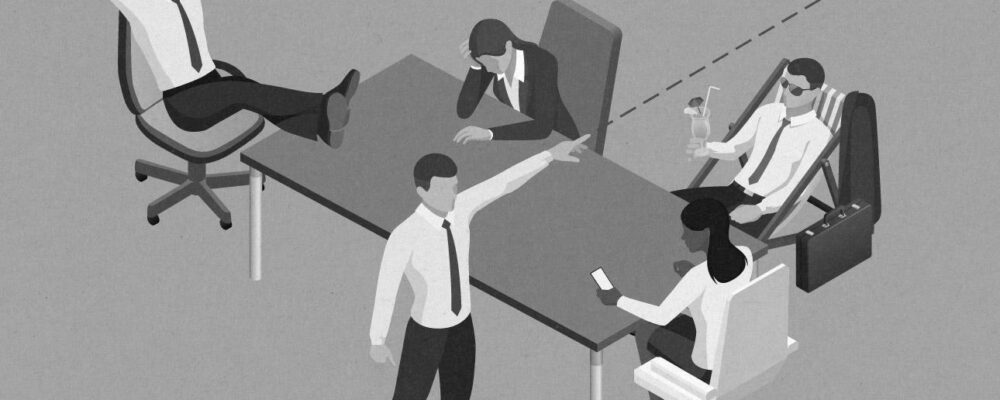Topics
Column
Our expert columnists offer opinion and analysis on important issues facing modern businesses and managers.
More in this series
Carolyn Geason-Beissel/MIT SMR | Getty Images
Let me ask you some questions to get this discussion started. In the past week or two at work, did you see anyone:
- Tell someone that their thoughts or feelings are stupid?
- Insult others in public meetings to humiliate or cause discomfort to them?
- Lie and break promises to others?
- Throw others under the bus to save or promote themselves?
- Suck up to their boss and expect their subordinates to do the same to them?
- Treat coworkers as competitors and potential enemies?
These are the kinds of behaviors assessed on Stanford professor Robert Sutton’s Asshole Rating Self-Exam and Ohio State professor Ben Tepper’s “abusive supervision” scale.1 I hope that after having received two decades of attention, these particularly egregious, explicit forms of bad behavior are indeed less common than they used to be — and that you could answer “no” to most or all of the six questions.
Get Updates on Transformative Leadership
Evidence-based resources that can help you lead your team more effectively, delivered to your inbox monthly.
Please enter a valid email address
Thank you for signing up
But even if that’s true, I worry that we have an equally big problem that we’re not calling out nearly enough. Consider this next set of questions. In the same period of time, did you see anyone:
- “Multitask” by looking at their phone or being on their computer while others are talking?
- Show up late, or not at all, for meetings or events they’ve agreed to attend?
- Interrupt or talk over someone else who is speaking?
- Fail to show respect for what someone knows or how hard they’ve worked?
- Display body language that conveys disinterest, disgust, or condescension?
- Show favoritism to in-group members in ways that hurt those excluded?
Based on what I experience these days, and what the data I’ve been collecting shows more systematically, I’d guess that you’ve seen a lot of these behaviors recently — and that if you asked others to answer anonymously, they’d say you sometimes do a fair number of those things. I know that I do.
The problems being caused by nice jerks are, in aggregate, likely greater than the harm caused by more obviously abusive behaviors.
I’m not saying that we behave in these ways with intent to harm, or even consciously. And many people who do these things often are otherwise seen as decent, upstanding people. But if you do them often enough, I think it creates the impression that you’re a “nice jerk” — someone who repeatedly shows disrespect in seemingly small ways that, individually and collectively, have a really negative impact on people and the organization’s culture.
And I’d argue that the problems being caused by nice jerks are, in aggregate, likely greater than the harm caused by more obviously abusive behaviors — because these forms of disrespect are far more common and much less likely to be called out and stopped.
Disrespectful Behaviors That Do Damage
During the past couple of years, I’ve asked hundreds of working professionals to provide three examples of “disrespectful behavior.” I started asking this because I wondered whether I was just getting older and crankier or whether other people were noticing changes that seemed to have started with the increased ubiquity of phones and laptops and worsened in the wake of the pandemic. The results: Many other people were feeling bothered by similar behaviors — often not overtly abusive ones but more “everyday” behaviors. Only two of the top 10 themes that emerged were about hurtful, condescending speech or public criticism and humiliation. The five most common themes in my data were as follows:
- Interrupting and talking over others: Not letting someone finish their train of thought; consistently finishing someone’s sentences; cutting in to score points.
- Multitasking: Being on a phone or laptop in meetings; failing to look up from a device when spoken to; asking a question and then doing something else during the response.
- Showing disregard for others’ effort or expertise: Ignoring or trivializing someone’s contributions; discarding their effort without consideration; downplaying their knowledge or experience.
- Showing disregard for others’ time: Consistently showing up late; not showing up for planned events; ignoring deadlines; requiring attendance at pointless meetings; failing to do advance reading and therefore wasting time during a meeting.
- Failing to include others: Not bringing relevant people into the loop; showing favoritism in who gets to speak or who is listened to; inviting some people to events while excluding others who are in the same role and level in the organizational hierarchy.
I next asked people how they felt when they experienced these types of disrespect. “Anger” and related words (like “outraged” and “ticked off”) were mentioned by 81% of respondents. Anger’s close cousin, frustration, was mentioned by 36%. Disrespectful behavior also left more than 1 in 4 feeling insignificant and anxious — and insecure about their position or value. And more than 1 in 5 said they felt sad. The number of people feeling sadness is likely higher, given that the hurt from being disrespected often is initially masked by anger, especially in men.
And how did people say they respond in these situations? Not surprisingly, given their feelings, they react with a range of fight-or-flight behaviors. Some people said they become aggressive and combative. “I bite back,” noted one. Some admitted to fighting back more subtly: Think hard-to-detect, undermining behavior. Conversely, other people shut down: They avoid or ignore the offender, they zone out in certain settings, or they disengage altogether and give less to that relationship or their job. These are all understandable coping behaviors in the face of disrespect, but it’s hard to argue that any of them are desirable.
Are You Ready to Be Nicer?
I know that seems like a rhetorical question, but it’s clearly harder than it seems — or people wouldn’t be able to rattle off instance after instance of disrespectful behavior as soon as I finish asking for examples. And if we were all so good at being respectful, Donald and Charles Sull wouldn’t have reported in a previous MIT SMR piece that employees “feeling respected” is 17.9 times more powerful a predictor of an organization’s overall culture score than the average factor, and almost twice as strong as the second-most-important factor, supportive leadership.2
Here are three areas to examine and improvement ideas to consider. Some will likely initially strike you as too hard or too harsh. Maybe they are. Or maybe we have to admit that this issue has reached the point where it’s going to take this level of action to create the culture of respect we say we want.
Call B.S. on “multitasking.”
I put “multitasking” in quotes because it’s actually a misnomer. Neuroscientists are in agreement that the human brain actually can’t multitask; it’s designed to focus on only one thing at a time. When people say that they’re multitasking, they’re really saying that they’re sequentially switching their attention back and forth between two or more things.
So the first step to take is to simply stop accepting this excuse when someone is not paying attention or is acting like they’re listening when they’re not. Tachi Yamada, the great physician leader (and former head of R&D at both GlaxoSmithKline and Takeda Pharmaceuticals), understood how important his full attention was to making other people feel like he cared. He wouldn’t have his phone on or look at his computer screen during meetings. “Every moment counts,” he said, “and that moment is lost if you’re not in the moment 100%.”3
How do we get to a tech-free environment in meetings where people’s full attention is crucial? Announce clear expectations and expect pushback.
Start with a statement that devices are to be turned completely off. Alternatively, allow technology, but only for very clearly stated purposes, like note-taking or looking at something when instructed to. And be prepared to call people out. (Let’s be real: There is a lot of lying about “only using it for note-taking.”)
Stop accepting multitasking as an excuse when someone is not paying attention or is acting like they’re listening when they’re not.
In virtual meetings, where you can’t control others’ device access, being serious about this means calling people out publicly (“Jim, are you focused on something else right now?”) or privately later (“Jim, I noticed you very often appeared to be looking at other devices or typing during the meeting. I don’t want to see that again.”)
Banning technology from certain spaces or meetings might sound draconian, but it’s actually consistent with a well-known strategy for helping people overcome addictive behaviors. It’s called physical binding — the adoption of strategies that put distance between the user and the drug of choice.4
Treat other people’s time like gold.
Time is the most truly finite thing of value we possess. No matter how much money or status you have, the most realistic expectation is that you can expect to have about 4,000 weeks of life in total.5 At work, we give a nod to the importance of how people spend their time by constantly emphasizing productivity and espousing that our people are our greatest asset. But then we tolerate all sorts of behaviors that waste people’s time, like making groups of people sit around waiting for one person to show up before beginning a meeting, or waiting for people who didn’t read the pre-read to get briefed in real time.
What if you just agreed that meetings would start at the scheduled time? And that there would be no restatements of anything covered in pre-reads? And what if you said you would no longer admit people — in person or from online waiting rooms — if they showed up more than a minute or two after the meeting started? At my business school, faculty members talk longingly about the days when the classroom doors prevented students from entering after a class had started. Some will say that’s too harsh — an opinion that may reflect how our growing conflict aversion has led us to be more tolerant of disrespectful behaviors these days.
We could also start using technology to measure these kinds of disrespectful behaviors in order to discourage them. I don’t love the idea of tracking, nor do I love “lock the door when the meeting starts.” Sadly, though, I think there are three basic approaches to chronic lateness and time disrespecters:
- Ask/remind people nicely. This option has failed miserably and likely isn’t going to work, given the point we’ve reached.
- Publicly or privately call it out, creating both social shame and/or additional consequences. This approach doesn’t tend to work for people who are conflict-avoidant and/or those who have less power on the organizational chart.
- Create systems/structures that tackle the problem in ways that people won’t. This approach acknowledges the realities of the previous two options and requires that leaders enforce accountability around respect for everyone’s time.
Teach and evaluate listening skills.
Think about all of the professional or leadership development training you’ve had. Almost certainly, it has included a lot of content on how to be a better communicator. How to be more inspiring, how to be more persuasive, how to sell your issue more effectively, how to pitch your idea better, how to win a debate or negotiation — the list of ways to improve what comes out of your mouth is incredibly long. Similarly, just about every leadership assessment contains multiple categories related to speaking ability.
Conversely, we’ve spent incredibly little time and effort teaching or assessing listening skills. All of my colleagues teach something related to speaking effectively; few teach anything focused on listening better. It’s an odd omission, given that any real conversation requires both speaking and listening in order to be successful.
So if you want people at your organization to stop interrupting all the time, model it yourself. Force yourself to stop thinking about what you’re going to say next while pretending to listen. Curtail other behaviors that convey you don’t care about the knowledge, experience, or feelings of the speaker. And teach people how to listen better.
Like speaking, listening is a skill that can be learned and improved with practice. People can learn to paraphrase or summarize what they’ve heard and to show nonjudgmental acceptance of the speaker’s perspective before replying. They can learn to ask good questions, maintain eye contact, and pay attention to the speaker’s nonverbal cues. And they can be held accountable for their listening behaviors using the same assessments that capture input on their speaking skills.
None of these suggestions are that hard or that costly to implement. But this approach does require that we clarify what we consider “mean” and “nice.” I don’t think the steps outlined above — like banning technologies from certain meetings and holding people accountable for exhibiting desired behaviors — are harsh or inappropriate. I think they’re mechanisms that acknowledge how hard it is to be routinely respectful in the world we live in, and they’re therefore worth some investment to assist us all in doing better.
References
1. R.I. Sutton, “The No Asshole Rule: Building a Civilized Workplace and Surviving One That Isn’t” (New York: Warner Business Books, 2007); and B.J. Tepper, “Consequences of Abusive Supervision,” Academy of Management Journal 43, no. 2 (April 2000): 178-190.
2. D. Sull and C. Sull, “10 Things Your Corporate Culture Needs to Get Right,” MIT Sloan Management Review, Sept. 16, 2021, https://sloanreview.mit.edu.
3. A. Bryant, “Talk to Me. I’ll Turn Off My Phone,” The New York Times, Sunday, Feb. 28, 2010, sec. BU, p. 2.
4. A. Lembke, “Dopamine Nation: Finding Balance in the Age of Indulgence” (New York: Dutton, 2021).
5. O. Burkeman, “Four Thousand Weeks: Time Management for Mortals” (New York: Farrar, Straus and Giroux, 2021).
“The MIT Sloan Management Review is a research-based magazine and digital platform for business executives published at the MIT Sloan School of Management.”
Please visit the firm link to site






